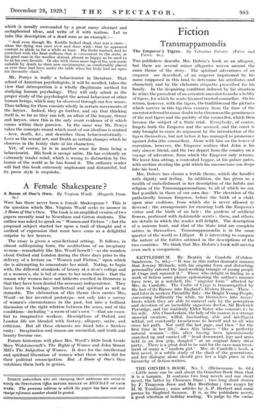A Female Shakespeare ?
Wiry has there never been a female Shakespeare ? This is the question which Mrs. Virginia Woolf seeks to answer in A Room of One's Own. The book is an amplified version of two papers recently read to Newnham and Girton students. The author was asked to speak on " Women and Fiction " ; but the proposed subject started her upon a trail of thought and a method of expression that must have come as a delightful surprise to her hearers.
The essay is given a semi-fictional setting. It follows, in almost soliloquizing form, the meditations of an imaginary woman—remarkably like Mrs. Woolf herself !—as she wanders about Oxford and London during the three days prior to the delivery of a lecture on " Women and Fiction," upon which she is attempting to concentrate her mind. Noting, to begin with, the different standards of luxury at a man's college and at a woman's, she is led at once to her main thesis : that the reason why women have not hitherto excelled in literature is that they have been denied the necessary independence. They have been in bondage, intellectual and spiritual as well as domestic. The elaboration of this theme then carries Mrs. Woolf—or her invented prototype—not only into a survey of women's circumstances in the past, but into a brilliant discussion of the right relation between the sexes, and of the conditions—including " a room of one's own "—that are essen- tial to imaginative workers. Descriptions of Oxford and London life are blended with fantasy, allegory, satire, and criticism. But all these elements are fused into a flawless unity. Imagination and reason are reconciled, and truth and beauty become one.
Future historians will place Mrs. Woolf's little book beside Mary Wolstoneeraft's The Rights of Women and John Stuart Mill's The Subjection of Women. It does for the intellectual and spiritual liberation of women what those works did for their political emancipation. But A Room of One's Own outshines them both in genius.
































 Previous page
Previous page